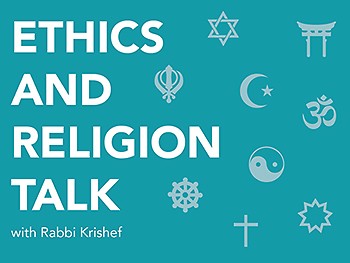We welcome a new Ethics and Religion Talk panelist this week. Chris Curia is a writer and youth director at Fairway Christian Reformed Church. He has authored articles for several online publications, including Sojourners, Relevant, and the Network. Chris also curates an online forum called Through the Darkness (chriscuringle.wordpress.com) in which he and his collaborators write about the intersections of spirituality, art, and culture. You can follow him across social platforms @chriscuringle.
Chris responds to Saul:
“I love the practicality of your question! Author Brené Brown correlates clarity with kindness, meaning simply that to be clear is to be kind. I would suggest getting in touch with your potluck host next time and asking upfront what their expectations are. I’m not aware of any formal rule of thumb for providing a dish at a potluck, although different cultures admittedly have different expectations. Those would be important to be aware of, especially if you are a guest of a particular culture with which you may be unfamiliar.”
The Reverend Colleen Squires, minister at All Souls Community Church of West Michigan, a Unitarian Universalist Congregation, responds:
“Our church often holds potlucks after our Sunday service. During the service we welcome everyone to join us including first time visitors. We understand that we may be feeding families that did not or were not able to contribute. We want to provide for those who are unable or those who just forgot. For Unitarian Universalists it is not about getting our fair share equal to what we brought to the meal but about hospitality, building community and fellowship. It is about sharing a meal together. In my opinion it is not rude to eat food at a potluck when you haven't brought anything to share. If this still feels uncomfortable offer to help clean up after the meal.”
Rev. Ray Lanning, a retired minister of the Reformed Presbyterian Church of North America, responds:
“It cannot be rude to partake of a ‘potluck’ supper or lunch, since the very idea is that all who happen to be on hand share whatever has been provided. You should have put the makings of your lunch on the table and shared them with the others, as did the wee lad with his two barley loaves and five small fishes (John 6:9).
“For Presbyterian and Reformed Christians there is no ‘luck’ involved. God knows who will be there, and He furnishes the table. In God’s providence there is always enough and often more. When harvesting ‘manna’ or the bread God gave them in the wilderness, some Israelites gathered more, and others less. But when they measured the haul, ‘he that gathered much had nothing over, and he that gathered little had no lack; they gathered every man according to his eating’ (Exodus 16:18). Trust in God, enjoy what He provides, and bring what you can to the next ‘potluck.’ ”
Father Michael Nasser, who writes from an Eastern Christian perspective and is Pastor of St. Nicholas Orthodox Christian Church, responds:
“My guess is that since potluck is, by definition, a shared meal, I’m sure that no one would think you rude for sharing your lunch and partaking of what they brought. One of the often-unnoticed miracles in our community is that even when it seems “no one” brought anything for potluck, there is always enough for everyone.”
Fred Stella, the Pracharak (Outreach Minister) for the West Michigan Hindu Temple, responds:
“This is an easy one. I cannot fathom not insisting that someone in your position partake of the feast if I were in charge. I would even extend that hospitality to someone who was informed about the occasion, but for any reason didn’t bring a dish. Nor can I envision myself not indulging, should I be the one to come empty-handed by mistake. If there is food, I eat.”
Father Kevin Niehoff, O.P., a Dominican priest who serves as Adjutant Judicial Vicar, Diocese of Grand Rapids, responds:
“I remember from the priest who taught me Logic that to respond to a question with another question is fallacious. However, if the individual who asked this question did not know about the potluck why would he/she be culpable for being rude simply because he/she did not bring a dish to pass?
“No, it is not rude to eat food at a potluck when you did not bring anything to share, especially if you did not know about it beforehand. If one has conscience pangs because he/she did not know about the potluck with enough notice to bring any food, then it is possible to either acquire something toothsome from a grocery store that delivers or even purchase prepared food from a restaurant that delivers or use a delivery service.”
This column answers questions of Ethics and Religion by submitting them to a multi-faith panel of spiritual leaders in the Grand Rapids area. We’d love to hear about the ordinary ethical questions that come up in the course of your day as well as any questions of religion that you’ve wondered about. Tell us how you resolved an ethical dilemma and see how members of the Ethics and Religion Talk panel would have handled the same situation. Please send your questions to [email protected].
The Rapidian, a program of the 501(c)3 nonprofit Community Media Center, relies on the community’s support to help cover the cost of training reporters and publishing content.
We need your help.
If each of our readers and content creators who values this community platform help support its creation and maintenance, The Rapidian can continue to educate and facilitate a conversation around issues for years to come.
Please support The Rapidian and make a contribution today.
